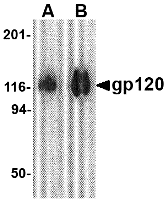Catalog# : 4641
Human immunodeficiency virus type 1 (HIV-1) entry into target cells is directed by the envelope (Env) glycoproteins, which are present on the surface of HIV-1 virion or infected cells in the form of trimers consisting of gp120/gp41 complexes. The surface subunit, gp120, initiates the entry process by interacting sequentially with the CD4 receptor and a co-receptor CCR5 or CXCR4, thereby inducing a conformational change that allows the transmembrane (TM) gp41 subunit to mediate fusion between viral and target cell membranes. Cleavage of Env into its gp120 and gp41 components is necessary for activation of its fusogenic activity.
Additional Names : gp120 (NT), HIV-1 glycoprotein 120
 Description
DescriptionLeft: Western blot analysis of 1 mg of gp120 with gp120 antibody at (A) 0.5 and (B) 1 µg/ml.
Source : gp120 antibody was raised against 16 amino acid peptide representing the major HIV-1 consensus sequence near the N-terminal region of V1/V2 loop.
Purification : Affinity chromatography purified via peptide column
Clonality and Clone : This is a polyclonal antibody.
Host : gp120 antibody was raised in rabbit. Please use anti-rabbit secondary antibodies.
Application : Gp120 antibody can be used for detection of gp120 by Western blot at 0.5 – 1 µg/ml.
Tested Application(s) : E, WB
Buffer : Antibody is supplied in PBS containing 0.02% sodium azide.
Blocking Peptide : Cat.No. 4641P - gp120 Peptide
Long-Term Storage : gp120 antibody can be stored at 4ºC, stable for one year. As with all antibodies care should be taken to avoid repeated freeze thaw cycles. Antibodies should not be exposed to prolonged high temperatures.
Species Reactivity :V
GI Number : 49617711
Accession Number : AAT67551
Short Description : (NT) HIV-1 glycoprotein 120
References
1. Pinter A. Roles of HIV-1 Env variable regions in viral neutralization and vaccine development. Curr. HIV Res. 2007; 5:542-53.
2. Alkhatib G and Berger EA. HIV coreceptors: from discovery and designation to new paradigms and promise. Eur. J. Med. Res. 2007; 12:375-84.

No comments:
Post a Comment